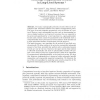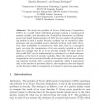1597 search results - page 12 / 320 » Mental Models of Computer Security |
102
click to vote
CONCUR
2008
Springer
15 years 3 months ago
2008
Springer
Abstract. For many cryptographic protocols, security relies on the assumption that adversarial entities have limited computational power. This type of security degrades progressive...
110
click to vote
TCC
2009
Springer
16 years 2 months ago
2009
Springer
It is well known that general secure function evaluation (SFE) with information-theoretical (IT) security is infeasible in presence of a corrupted majority in the standard model. ...
ESORICS
2006
Springer
15 years 5 months ago
2006
Springer
We study the problem of Secure Multi-party Computation (SMC) in a model where individual processes contain a tamper-proof security module, and introduce the TrustedPals framework, ...
106
click to vote
NN
2006
Springer
15 years 1 months ago
2006
Springer
Neurophysiology reveals the properties of individual mirror neurons in the macaque while brain imaging reveals the presence of `mirror systems' (not individual neurons) in th...
112
click to vote
CCS
2006
ACM
15 years 5 months ago
2006
ACM
The central goal of secure information sharing is to "share but protect" where the motivation to "protect" is to safeguard the sensitive content from unauthori...


